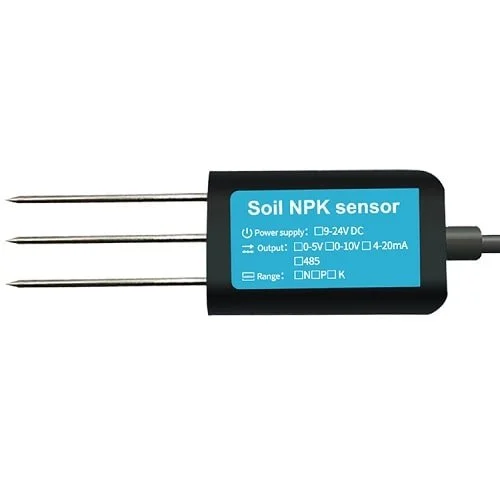Soil Sensor JXBS-3001-NPK-RS
₹7,000.0
| Brand | JXCT |
| Part Number | JXBS-3001-NPK-RS |
| Measuring Range | 0-1999mg/kg |
| Resolution | 1mg/kg |
| Output Signal | RS485 |
| Output | 0-10V |
| Measurement Type | NPK |
Soil Sensor JXBS-3001-NPK-RS Introduction
Soil Sensor JXBS-3001-NPK-RS is a high functional and digital display soil meter, it can quickly test nitrogen phosphorus potassium of different kinds of soil. The soil NPK meter is precision, quick, stable, wide range, display clear, portable and easy to test.
- NPK is an important element in soil
- Traditional detection method: After obtaining the soil samples intelligently, they are sent to a professional laboratory where the researchers operate the equipment. It is time consuming, labor intensive, and costly, making it impossible to quickly detect on site.
- Easy to measure
- The detection of soil NPK is no longer limited to the industry.
- High Precision
- ±2%F.S.
- Low Measurement Cost
- Compared with traditional laboratory measurements, this product has low threshold, low cost, few steps, no reagents, no limit on the number of inspections.
- Resolution up to 1mg/kg
- It is on-site quick inspection, easy to carry and insert in the soil to take the number, shorten the time cost, no reagents, no limits on the number of inspection.
- Portable measurement to accurately grasp soil fertility
- Users can measure the soil condition at any time, according to the soil condition can be prescribed symptomatic medicine. Make the soil fertility balanced and reach the growth environment suitable for plants.
- Change the traditional measurement method and improve the measurement efficiency.
- We are committed to creating convenient and economic products.
- Traditional Detection – Traditional testing is time- consuming and cost-effective in laboratory sampling and analysis.
- Soil Nitrogen – Phosphorus and Potassium Detector has the advantages of fast measurement, low cost and accurate data.
- We are committed to creating convenient and economic products.
JXBS-3001-NPK-RS Characteristic
- Imported high quality soil NPK sensor and chips.
- Special design of soil NPK meter, with a great penetration of soil.
- Unique sensing technology, with a wide working range and quick display.
- High quality soil nutrient sensor with stable sensing ability.
- Portable design and easy testing.
- Low power consumption, reliable function.
- IP68 soil npk meter, with fully water proof function.
Application
- Detection of Acid Soil
- Alkaline Soil Detection
- Matrix Soil Detection
- Seedbed Soil Testing
- Copra Soil Testing
You must be logged in to post a review.
Q & A
Sensors play a crucial role in modern agricultural farming practices by providing real-time data and insights that help optimize resource management and improve overall efficiency. When it comes to sustainability, agricultural sensors can have several positive impacts. Here are some key points to consider:
Resource optimization: Sensors enable precise monitoring and control of resources such as water, fertilizers, and pesticides. By collecting data on soil moisture, nutrient levels, and pest populations, farmers can apply these resources only when and where they are needed, minimizing waste and reducing environmental impact.
Precision farming: Sensor technologies, including aerial imagery, drones, and satellite-based sensors, allow farmers to gather data at large scales. This information helps identify variability within fields, enabling targeted interventions and reducing the need for blanket applications of inputs. By optimizing resource usage, precision farming can lead to sustainable practices that conserve resources and minimize the ecological footprint of agriculture.
Disease and pest management: Sensors can monitor environmental conditions and alert farmers to potential disease outbreaks or pest infestations. Early detection enables timely interventions, reducing the need for broad-spectrum chemical treatments. By implementing integrated pest management strategies based on sensor data, farmers can minimize pesticide usage and protect beneficial organisms, fostering more sustainable farming practices.
Soil health management: Sensors can assess soil parameters like moisture content, pH levels, and organic matter content. This data allows farmers to make informed decisions about soil management practices, including irrigation scheduling, soil amendments, and crop rotation. By optimizing soil health, sensors contribute to sustainable agriculture by reducing soil erosion, nutrient leaching, and soil degradation.
Energy efficiency: Many agricultural sensors are designed to operate with low power consumption and can be powered by renewable energy sources such as solar panels. This reduces the reliance on fossil fuels and contributes to energy efficiency in farming operations.
However, it's important to note that the sustainability of sensors for agricultural farming also depends on other factors such as the materials used in sensor production, their lifespan, and responsible disposal at the end of their useful life. It's crucial to consider the complete life cycle of sensor technologies and ensure proper recycling or disposal to minimize environmental impact.
Overall, agricultural sensors have the potential to greatly enhance the sustainability of farming practices by improving resource management, optimizing inputs, and reducing environmental impact. However, it is important to carefully evaluate the specific sensors being used and their implementation to ensure they align with sustainable farming principles.
General Inquiries
There are no inquiries yet.



Reviews
There are no reviews yet.